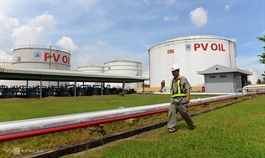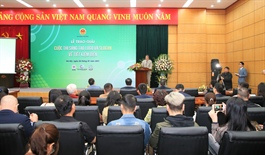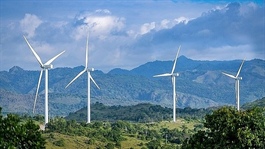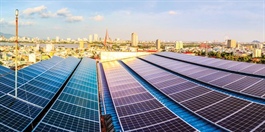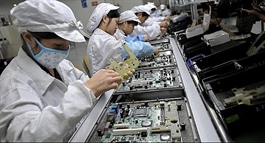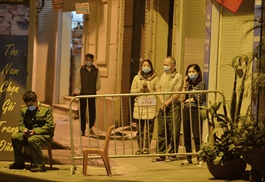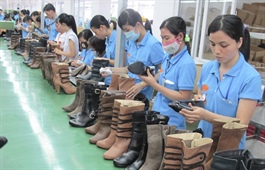New principles for energy efficiency
New principles for energy efficiency

Baker McKenzie managing partner Frederick Burke and special counsel Nguyen Thanh Hai
|
Circular 25 is one of the steps towards implementation of the previously-approved National Energy Efficiency Programme for 2019-2030. Compared to the previous Circular No.09/2012/TT-BCT on economical and efficient energy use, Circular 25 provides three main changes: removing burdensome admin requirements to register and report on implementation of an annual/five-year Energy Efficiency Plan (EEP); broadening the scope of energy consumers required to report on their annual energy consumption; and providing cases of exemption from energy audits.
Circular 25 provides new guidelines on cases where businesses and entities are required to register for and report on the implementation of their annual and 5-year EEP.
These can be major energy-using consumers – industrial manufacturers, agricultural production facilities, or transport entities with total energy consumption per year from 1,000 tonnes of oil equivalent (TOE); or offices and houses; educational or medical facilities; entertainment, physical training, and sports establishments; and hotels, supermarkets, restaurants, and shops with total energy consumption per year from 500 TOE.
They can also be state-funded agencies or entities wholly or partly funded by state capital, with annual energy consumption of over 100,000kWh according to the customer list of Electricity of Vietnam.
These major energy consumers or state-funded entities will be required to submit its registration and report on the implementation of its EEP to the relevant provincial-level Department of Industry and Trade (DoIT).
Registration and reporting
Under Circular 25, major energy consumers/state-funded entities may now follow a simplified and paperless procedure to register their annual EEP, as follows:
l By no later than 30 April every year, major energy consumers/state-funded entities must access dataenergy.vn and enter their data according to the instructions on the website. Within 20 days from receipt of the report, the DoIT will be required to review, respond, and confirm the submission result on the website.
l Upon receiving a request from the DoIT to supplement or adjust their registered contents, major energy consumers/state-funded entities must update their data accordingly on the website within 20 days from receipt of the DoIT’s request.
Circular 25 also provides for new templates of the annual EEP and the report on the implementation of this plan in the previous year, customised for state-funded entities as well as different types of major energy consumers, from industrial and agricultural facilities to commerce and service establishments.
A major energy consumer/state-funded entity is responsible for the full implementation of its registered annual EEP. For state-funded entities, compliance with the Law on Economical and Efficiency Use of Energy is also required.
The new circular likewise streamlines the procedures for big energy consumers to register their 5-year EEP and report on the implementation of their previous 5-year EEP, in the same vein as that aforementioned for annual procedures. The report on the implementation of the 5-year EEP will then be calculated and updated automatically via the national energy database system, based on the consumers’ annual reports.
Circular 25 also provides for new templates of the 5-year EEP and the report on the implementation of this plan customised for different types of major energy consumers.
A major energy consumer is responsible for the full implementation of its registered 5-year EEP.
Report and implementation
The circular broadens the scope of energy consumers required to report to the DoIT on their annual energy consumption. These are major energy consumers listed in the decision of the prime minister issued in the previous year; industrial manufacturing, agricultural production, and transport entities with total energy consumption per year from 600 TOE (or from 3.6 million kWh); buildings and construction works with total energy consumption per year from 300 TOE (or from 1.8 million kWh); and state-funded entities.
Energy consumption reports are now fully submitted online through the same website. The DoIT will provide the above energy consumers with login accounts and instructions for submitting their energy consumption data. In case of a request from the DoIT to supplement or adjust the energy consumption report, energy consumers must update their data accordingly on the website within 20 days from receipt of the DoIT’s request.
Circular 25 requires major energy consumers to apply the energy management model as provided in Decree No.21/2011/ND-CP released in March 2011 on detailing the Law on Economical and Efficient Use of Energy and measures for its implementation.
This model includes, among other contents, major energy consumers’ objectives and policies on energy efficiency, annual and 5-year EEPs, energy audits, proposals, and selection of managerial and technological solutions for energy efficiency.
Major energy consumers must also access the website to report to the DoIT on their application of the energy management model in their annual plan of energy use.
A major energy consumer must carry out an energy audit once every three years, as per Circular 25. The report on energy audit results will include full figures of survey data and specific calculations reflecting the status of energy use.
The energy audit report must also include an analysis, calculation and evaluation of energy efficiency; evaluation of energy saving potential; and proposed energy-saving solutions, with a full analysis of the investment efficiency of each solution for consideration by the major energy consumer.
The major energy consumer must send the energy audit report to the DoIT within 30 days of the audit’s completion. A major energy consumer operating in the transport business industry may also be exempted from implementing energy audits from the DoIT. Major energy consumers operating in several sectors, including transport operations, are only exempted from performing energy audits for transport activities.
Industrial, agricultural production, construction, and transportation facilities/entities that are not classified as major energy consumers are encouraged to periodically execute their energy audits in 3-5 year cycles in order to identify energy savings opportunities and apply suitable energy efficiency measures.
Introducing new energy-related planning and reporting requirements, with little in the way of specific incentives or penalties, may leave enterprises wondering if the time and costs are worthwhile, and it is uncertain whether administrative fines will be an effective enforcement tool, enforced fairly.







